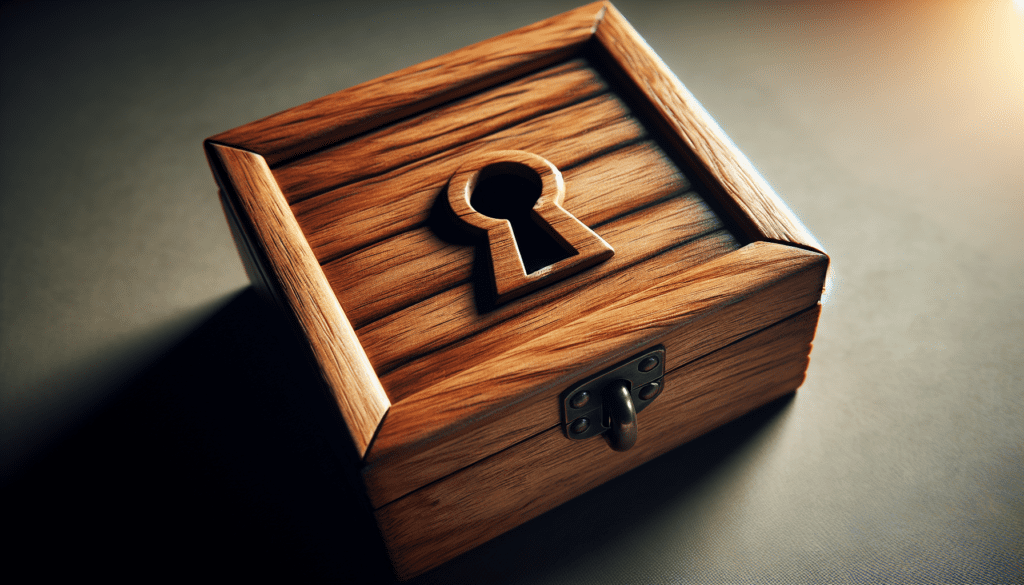Have you ever wondered what it means if you are good at escape rooms? You know, those exhilarating and immersive games where you and your friends are trapped in a room and must solve puzzles and find clues to escape within a set time limit? Being proficient in these mind-bending challenges not only showcases your problem-solving skills and ability to think outside the box, but it also signifies a knack for teamwork and effective communication. So, if you find yourself escaping from these virtual worlds with ease, it might just be a testament to your cleverness and flair for adventure.

Understanding Escape Rooms
What are Escape Rooms?
Escape rooms are interactive adventure games where a group of participants are locked in a room and must solve a series of puzzles and riddles within a set time limit to escape. These rooms are designed to challenge players’ mental and physical abilities, providing a unique and immersive experience. They can be themed around various settings, such as prison cells, haunted houses, or science laboratories, adding an extra layer of excitement to the game.
How do Escape Rooms Work?
Escape rooms typically consist of a series of interconnected puzzles and challenges that require logical thinking, problem-solving skills, and collaboration to solve. Participants must search the room for hidden clues, decipher codes, unlock locks, and uncover hidden compartments. The puzzles may vary in difficulty, integrating different elements like math problems, word games, spatial reasoning, and pattern recognition. Successful completion of each puzzle unlocks the next clue, leading the players closer to their ultimate goal of escape.
Why are Escape Rooms Popular?
Escape rooms have gained significant popularity in recent years due to their unique blend of excitement, challenge, and social interaction. These immersive experiences offer a break from reality, engaging players both mentally and physically. They provide an opportunity to test one’s problem-solving abilities in a high-pressure situation, offering a thrilling sense of accomplishment upon completion. Additionally, escape rooms encourage teamwork and communication, making them an ideal choice for team-building activities and social gatherings.
The Skills Required for Success
Critical Thinking
Critical thinking is a vital skill for success in escape rooms. It involves analyzing the given information, making logical connections, and evaluating potential solutions in order to solve a problem. The ability to think critically allows players to approach puzzles from different perspectives, identify patterns or hidden clues, and make sound decisions within the time constraints of the game.
Problem-Solving
Escape rooms demand strong problem-solving skills. Participants must think creatively and strategically to decipher clues, connect the dots, and overcome challenges. Effective problem-solving involves breaking down complex tasks into manageable steps, using trial and error to test different approaches, and adapting strategies based on the feedback received.
Collaboration
Collaboration is essential in escape rooms, as players must work together as a team to solve puzzles and escape. Successful collaboration requires effective communication, active listening, and the ability to share information and ideas. By leveraging each team member’s strengths and expertise, participants can combine their efforts to tackle challenges more efficiently and increase their chances of success.
Communication
Clear and effective communication is key to success in escape rooms. Players must share information, ideas, and observations with their teammates in a concise and timely manner. Effective communication ensures that everyone is on the same page, avoids duplication of efforts, and maximizes the team’s efficiency.
Attention to Detail
Attention to detail is crucial in escape rooms, as even the smallest clue or piece of information can lead to a breakthrough. Players must carefully observe their surroundings, search for hidden objects, and pay attention to minute details that may hold valuable information. Being observant and detail-oriented can significantly enhance a team’s ability to solve puzzles and overcome challenges.
Time Management
Escape rooms are a race against the clock, making time management a critical skill for success. Players must prioritize tasks, allocate time efficiently, and avoid getting stuck on a single puzzle. Effective time management ensures that the team can progress through the game at a steady pace, maximizing their chances of escaping before the time runs out.
The Benefits of Being Good at Escape Rooms
Improved Cognitive Abilities
Engaging in escape rooms can have significant cognitive benefits. The complex puzzles and challenges stimulate critical thinking, problem-solving, and mental agility. Regular participation in escape rooms can sharpen cognitive abilities such as logic, reasoning, and memory, enhancing overall mental acuity.
Enhanced Teamwork Skills
Escape rooms are designed to foster teamwork and collaboration. Being good at escape rooms means being able to effectively communicate, cooperate, and delegate tasks within a group. These skills are transferable to various real-world situations, such as in the workplace or in group projects, where collaboration and effective teamwork are highly valued.
Effective Communication
Being good at escape rooms often goes hand in hand with strong communication skills. Successful escape room players are skilled at conveying their thoughts, ideas, and observations clearly and succinctly. This ability to communicate effectively translates to better interpersonal relationships and improved communication in real-world scenarios.
Increased Self-Confidence
Successfully escaping from an escape room can boost an individual’s self-confidence. It provides a sense of accomplishment, highlighting one’s problem-solving abilities and resilience in the face of challenges. This increased self-confidence can spill over into other aspects of life, empowering individuals to tackle difficult tasks with a positive mindset.
Stress Relief
Escape rooms offer a thrilling and immersive experience that allows participants to temporarily escape from the pressures of everyday life. The focus required to solve puzzles and the adrenaline rush of the game can provide a welcome distraction and a form of stress relief. Engaging in escape rooms can help individuals unwind, recharge, and regain mental clarity.
The Relation between Escape Room Success and Real-World Skills
Transferable Problem-Solving
The problem-solving skills developed in escape rooms can be directly transferred to real-world scenarios. The ability to think analytically, break down complex problems, and generate creative solutions is valuable in many fields, including business, engineering, and scientific research. Being good at escape rooms signifies a strong foundation in problem-solving that can be applied to various professional and personal situations.
Leadership Potential
Escape rooms often require players to take on leadership roles within the team. Being good at escape rooms can indicate strong leadership potential, as effective leaders are able to guide and motivate their team members, delegate tasks, and make critical decisions under pressure. The leadership skills honed in escape rooms can be valuable in professional settings, where the ability to lead and inspire others is highly sought after.
Adaptability and Flexibility
Escape rooms are designed to present unexpected challenges and obstacles, requiring participants to think quickly and adapt their strategies on the fly. Being good at escape rooms implies a certain level of adaptability and flexibility, as successful players can quickly adjust their approach when faced with new information or changing circumstances. These qualities are highly valued in dynamic and fast-paced environments, where the ability to adapt and find innovative solutions is essential.
Creativity and Innovation
Escape rooms encourage participants to think outside the box and approach problems from unconventional angles. Being good at escape rooms indicates a certain level of creativity and innovation, as successful players are able to generate unique and imaginative solutions to puzzles and challenges. These qualities are highly sought after in creative professions, entrepreneurship, and any field that requires innovative thinking.
Decision-Making
Escape rooms often present players with time-sensitive decisions that can significantly impact their progress in the game. Being good at escape rooms implies strong decision-making skills, as successful players must quickly assess the available information, evaluate the potential outcomes, and make informed choices. Effective decision-making is a critical skill in both personal and professional settings, where the ability to make sound judgments can lead to positive outcomes.

Enhancing Escape Room Performance
Practice and Familiarity
As with any skill, practice and familiarity can improve performance in escape rooms. Regularly engaging in escape room experiences allows individuals to become more comfortable with the challenges, strategies, and puzzle-solving techniques. Familiarity with different types of puzzles and puzzles mechanics can help players solve them more efficiently and effectively.
Observation and Perception
Enhancing observation and perception skills can significantly improve escape room performance. Paying attention to details, noticing subtle hints or patterns, and having a keen eye for hidden clues can make a substantial difference in solving puzzles quickly and progressing through the game successfully. Practicing mindfulness and training oneself to be more observant in everyday life can translate into heightened observation skills within escape rooms.
Effective Communication and Collaboration
Improving communication and collaboration skills is essential for enhancing escape room performance. Regularly practicing effective communication techniques, active listening, and teamwork can enhance coordination within the team and streamline the problem-solving process. Building strong communication and collaboration skills outside of escape rooms, such as through team-building exercises or group projects, can further enhance performance within escape rooms.
Strategic Planning
Developing strong strategic planning skills can give players an edge in escape rooms. Before embarking on solving puzzles, taking a moment to analyze the room, identify potential paths or connections between clues, and develop a coherent strategy can save valuable time and prevent getting derailed. Practicing strategic planning in daily life, such as organizing tasks or setting goals, can strengthen the ability to strategize effectively within escape rooms.
Learning from Mistakes
Embracing a growth mindset and learning from mistakes is crucial for improving performance in escape rooms. Reflecting on past experiences, analyzing what went wrong, and identifying areas for improvement can help hone problem-solving skills and prevent repeating the same mistakes in future escape room endeavors. Embracing mistakes as learning opportunities and approaching each new challenge with an open mind can lead to continuous improvement and increased success.
The Role of Personality Traits
Open-Mindedness
Being open-minded is beneficial for success in escape rooms. Open-minded individuals are willing to consider different perspectives, explore unconventional solutions, and embrace new ideas. This flexibility of thinking allows players to approach puzzles with a fresh mindset, think beyond traditional solutions, and discover alternative paths to success.
Perseverance
Perseverance is a key trait for success in escape rooms. Challenges within escape rooms can be difficult and frustrating, requiring players to persist in the face of setbacks and challenges. Those who possess a strong sense of perseverance are more likely to stay focused, maintain a positive attitude, and continue working towards finding solutions, even when faced with obstacles.
Resilience
Being resilient is crucial for success in escape rooms. Players may encounter unexpected twists or encounter difficult puzzles that initially seem unsolvable. Resilient individuals are able to bounce back from setbacks, adapt their strategies, and remain determined in the face of adversity. These individuals are better equipped to handle the pressures and challenges of escape rooms, pushing through until they find a solution.
Optimism
Optimism plays a significant role in escape room success. A positive mindset allows players to approach challenges with confidence, maintain motivation, and foster a sense of collaboration within the team. Optimistic individuals are more likely to see setbacks as temporary obstacles and believe in their ability to overcome them.
Curiosity
Curiosity is a valuable trait for success in escape rooms. Inquisitive individuals are eager to explore, question, and investigate their surroundings. This curiosity drives players to search for hidden clues, uncover secret compartments, and unravel the mysteries of the escape room. A sense of curiosity fuels the desire to discover and can significantly enhance problem-solving abilities within the game.

Escape Room Enthusiasts and Careers
Escape Room Employees
Being good at escape rooms can open doors to opportunities within the escape room industry. Escape room employees are responsible for creating immersive experiences, designing puzzles, and facilitating the game for participants. Those who excel at escape rooms may find themselves well-suited for roles as game masters, actors, or puzzle designers, contributing to creating memorable and enjoyable experiences for others.
Event Organizers
Escape room enthusiasts who thrive on creating unique and engaging experiences may find a natural fit in event organizing. By utilizing their knowledge of escape room dynamics, puzzle design, and immersive storytelling, they can create escape room-themed events, parties, or even larger-scale immersive experiences. Event organizers can harness their passion for escape rooms to provide memorable and enjoyable experiences for a wide range of participants.
Game Designers
The skills and knowledge gained from being good at escape rooms can be leveraged in the field of game design. Escape rooms are a form of interactive gameplay, and the ability to create captivating puzzles, engaging narratives, and immersive experiences is highly prized in the game design industry. Escape room enthusiasts can apply their expertise to design and develop innovative games, both within the escape room realm and in other forms of interactive entertainment.
Team-Building Instructors
Escape rooms are a popular choice for team-building activities, and being good at escape rooms can lead to a career as a team-building instructor. Using their knowledge of escape room dynamics, problem-solving, and teamwork, individuals can guide groups through challenging experiences that promote collaboration, communication, and trust-building. Team-building instructors facilitate the development of essential skills within organizations and provide valuable lessons that can be applied in the workplace.
Psychologists
Escape rooms offer a unique environment for exploration and observation of human behavior. Psychologists with an interest in the human mind and behavior may find escape rooms to be a valuable tool for research and analysis. By studying how individuals interact within escape rooms, psychologists can gain insights into teamwork dynamics, problem-solving strategies, and the impact of group dynamics on individual performance.
Escape Rooms as a Social Activity
Bonding and Building Relationships
Escape rooms provide an excellent opportunity for bonding and building relationships among participants. Working together to solve puzzles and overcome challenges fosters a sense of camaraderie and teamwork, allowing individuals to connect on a deeper level. The shared experience of escaping from a challenging room creates lasting memories and strengthens social bonds.
Creating Lasting Memories
Escape rooms offer a unique and memorable experience that participants can reminisce about for years to come. The excitement, laughter, and sense of accomplishment associated with escape rooms make them an ideal activity for special occasions, birthdays, or group outings. Creating lasting memories through shared experiences can strengthen existing relationships and forge new connections.
Promoting Friendly Competition
Escape rooms often incorporate an element of friendly competition, adding an extra layer of excitement to the experience. Competing against other teams or trying to beat previous high scores stimulates motivation and drives participants to perform at their best. Friendly competition within escape rooms can invigorate social interactions, encourage teamwork, and create a memorable and thrilling experience that participants can enjoy together.

Escape Rooms and Personal Growth
Discovering New Strengths and Weaknesses
Engaging in escape rooms can provide valuable insights into one’s strengths and weaknesses. The immersive and high-pressure setting of escape rooms can reveal hidden talents, problem-solving abilities, and leadership qualities that individuals may not have been aware of. Additionally, it can highlight areas for improvement, such as communication skills or attention to detail, providing an opportunity for personal growth and development.
Improving Problem-Solving Skills
Escape rooms are an excellent platform for improving problem-solving skills. The puzzles and challenges present in escape rooms require individuals to think critically, analyze information, and find creative solutions. Regularly participating in escape rooms can sharpen problem-solving abilities, encouraging individuals to approach problems in their everyday lives with a more strategic and innovative mindset.
Building Self-Esteem
Success in escape rooms can have a positive impact on an individual’s self-esteem. Overcoming challenging puzzles, collaborating effectively with others, and ultimately escaping from the room can instil a sense of achievement and boost self-confidence. This increased self-esteem can influence other areas of life, empowering individuals to take on new challenges and believe in their abilities.
Conclusion
Escape rooms offer a thrilling and immersive experience that goes beyond entertainment. Being good at escape rooms signifies a strong set of skills, including critical thinking, problem-solving, collaboration, and communication. These skills have real-world applications that can enhance personal and professional life. Escape rooms provide a unique environment for personal growth, building relationships, and developing valuable skills that are transferable to various aspects of life. Whether playing recreationally, pursuing a career in the escape room industry, or using escape rooms as a tool for personal development, the benefits and enjoyment derived from these experiences are undeniable. So, embrace the challenges, gather your team, and delve into the world of escape rooms for an unforgettable adventure.

